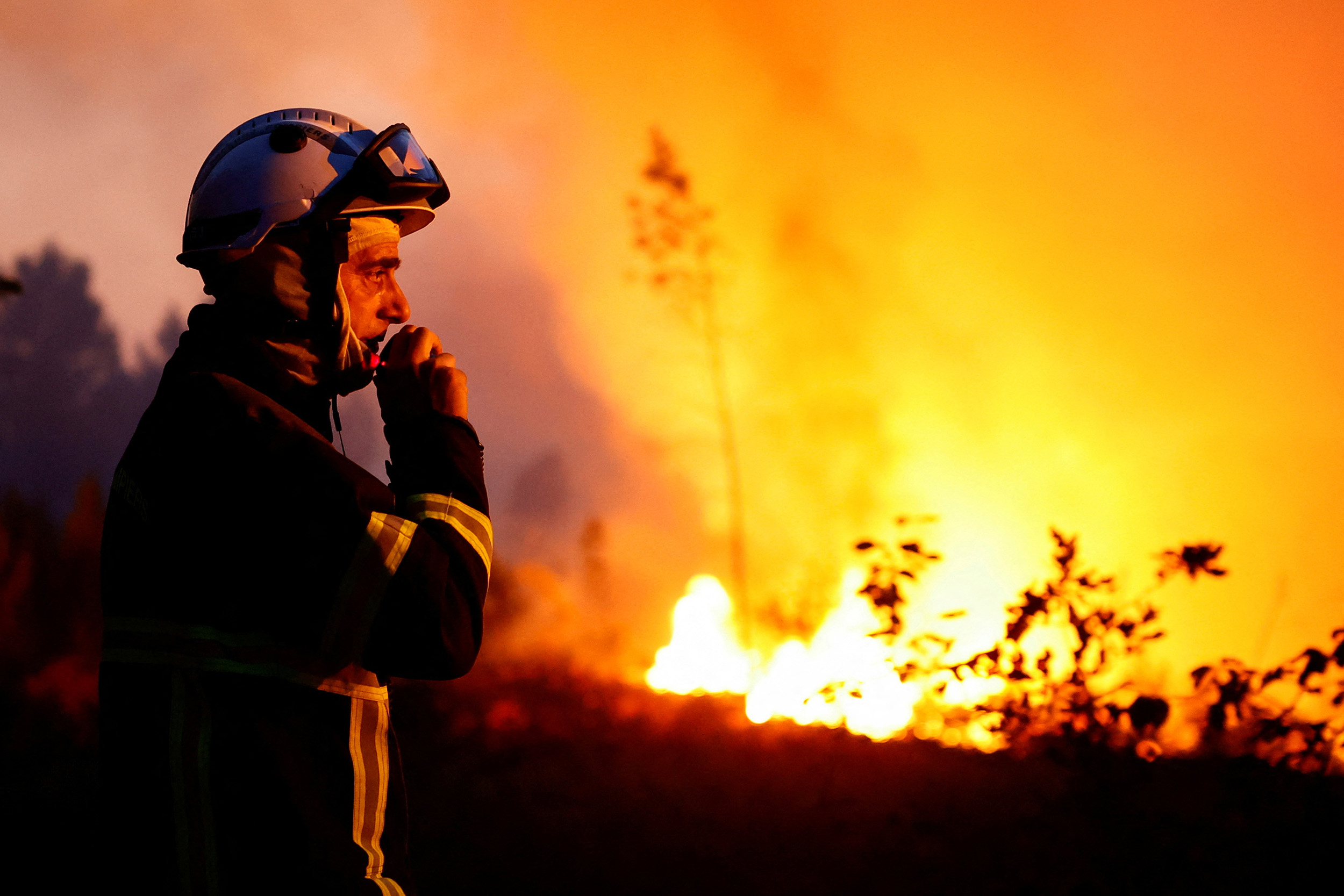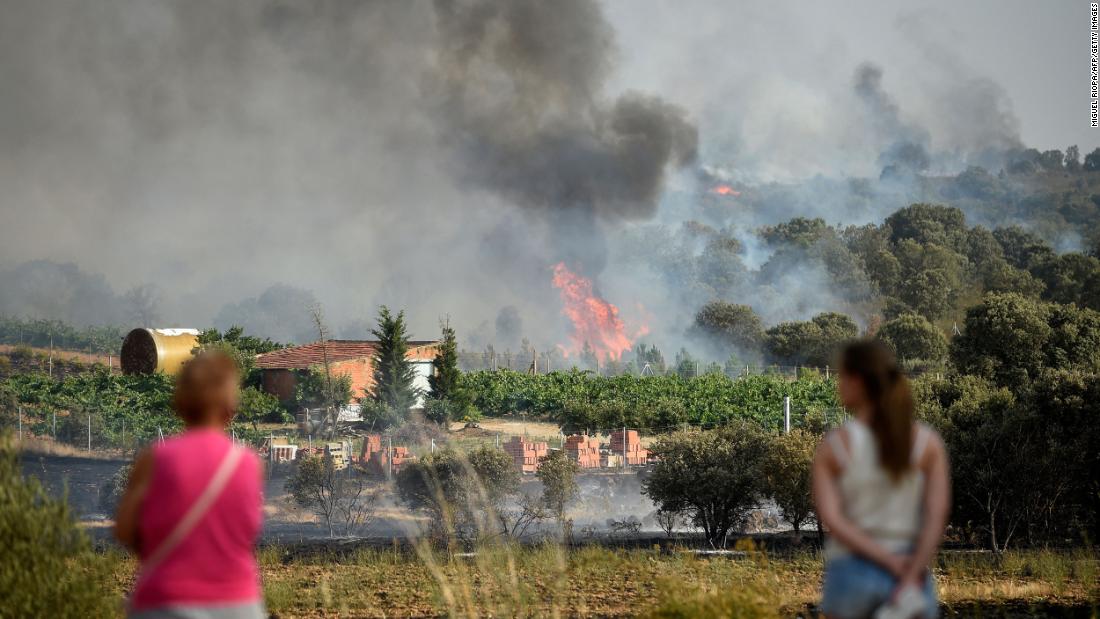[ad_1]

Scorching temperatures are sweeping western Europe, with the UK setting an all-time heat record, wildfires raging in France and Spain and a worsening drought in Portugal. At the same time, millions of Americans will see temperatures above 100 degrees Fahrenheit (37.7 degrees Celsius) this week.
If you’re just reading in, here’s what you need to know:
Record-breaking temperatures plague parts of Europe:
The UK has recorded a temperature of 40.3 degrees Celsius (104.54 degrees Fahrenheit) in Lincolnshire, England, according to the Met Office said, provisionally shredding its previous record of 38.7 degrees Celsius (101 degrees Fahrenheit).
Germany is bracing for temperatures of up to 40 degrees Celsius (104 degrees Fahrenheit) in some regions on Tuesday and Wednesday. The extreme high temperatures will cause drought and dryness in some areas across Germany and the risk of wildfires remains very high, experts say.
Belgium extended a “code red” weather warning to a third region of the country. “There is a sufficient chance that at least 25% of the province will reach 40 degrees,” said the head of forecasting at a Belgian meteorological institute.
A French town of Cazaux recorded 42.4 degrees Celsius (108.3 degrees Fahrenheit) on Monday — the hottest it has seen since its weather station first opened more than 100 years ago in 1921 — according to French national meteorological service Météo France.
Sweden issued on Tuesday an orange warning for extremely high temperatures of around 35 degrees Celsius (95 degrees Fahrenheit) in the southern part of the country for Wednesday and Thursday.
Hundreds have died in Portugal, where sweltering temperatures exacerbate a severe drought with the health ministry saying at least 659 mainly elderly people had died in the previous seven days, Reuters reported.
Meanwhile in the US, around a third of the population is under a heat alert on Tuesday and Wednesday as dangerous heat peaks today and tomorrow over much of the country. Nearly 20% of the US population, or about 60 million people, will likely see a temperature at or above 100 degrees Fahrenheit (37.7 degrees Celsius) this week. Among the hardest-hit areas are in the Southern Plains, including Texas, Oklahoma and Kansas, where intense heat will stick around until at least Tuesday.
Fires are raging with the risk of spreading further:
“Very Extreme Danger” of fire – the highest level of risk on the Fire Weather Index (FWI) scale – is forecast in Spain, France, Italy and the United Kingdom on Tuesday, according to the European Forest Fire Information System (EFFIS).
A third wildfire broke out in the Gironde region of western France, prompting the evacuation of 500 more people, according to the prefecture of Nouvelle-Aquitaine and Gironde. A total of 19,300 hectares (more than 47,000 acres) had already been burned by the two other fires in the Gironde. In total, 37,000 people have been evacuated.
In Spain, wildfires swept the central region of Castile and Léon, as well as the northern region of Galicia Sunday, Reuters reported.
At least two people have died and about 8,000 people have been evacuated so far as wildfires scorch areas across Spain, according to a government spokesperson. More than 70,000 hectares (more than 172,000 acres) have been destroyed in Spain because of fires this year, authorities say.
The London Fire Brigade has declared a “major incident” as firefighters battle several “significant” fires across the British capital on Tuesday during the record-breaking heat wave, it said in a tweet. It comes as around 100 firefighters and 15 fire teams are dealing with fires in an open green in Wennington, outside London, the Fire Brigade said on Twitter.
Severe weather is also disrupting travel:
On Monday, one of the UK’s largest airports suspended flights after high temperatures damaged a runway.
The Royal Air Force also paused all flights to and from Brize Norton in Oxfordshire, its biggest air base, after a report from Sky News suggested part of the runway had “melted.”
Also in London, commuters have been told not to use the city’s transportation services unless for “essential journeys” the Transport for London chief operating officer Andy Lord advised.
Network Rail, which owns and operates Britain’s railway, has asked people not to travel on Tuesday due to the extreme heat.
Spain has also suspended train services in the country’s northwest between Madrid and Galicia due to a fire close to the tracks, according to state-owned rail company RENFE.
The impact of climate change:
These temperatures are astonishing in the UK because they don’t reach this level often, and while they’re not as surprising in Spain, Portugal, and France, they are becoming more frequent and longer even in parts of Europe accustomed to dealing with heat.
Human-induced climate change is, in general, making the world hotter, extreme heat more likely and heatwaves more painfully long. Scientists in the business of attributing the role of the climate crisis to extreme weather now say it can be assumed that any heatwave has been made worse by climate change, primarily caused by humans burning fossil fuels.
Source link

